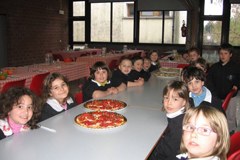News
Budoia: Lots of interest in (and enthusiasm for) the organic canteen
May 16, 2007
/
CIPRA Internationale Alpenschutzkommission
In spite of the difficulties Budoia is pushing ahead with the school canteen project, driven by the enthusiasm of parents, teachers and children. Thanks to the prize money from the Future in the Alps competition it has been possible to continue promoting the Project among the families and maintaining the education on nutrition among the schoolchildren.

Image caption:
The children prepared the fruits in the school laboratory, which was set up thanks to the Award from Future in the Alps. Mensa bio Budoia
The children who eat at the canteen attend the kindergarten and the primary school, and consume a total of 180 meals a day. The canteen's services are also used by around 10 teachers and a number of municipal employees. A total of 22,000 meals are prepared during each school year. The Project's profile has been greatly raised by feedback from the Prize and the launch of the "purchasing syndicate" for families. Report, one of the best news programmes on Italy's national station RAI 3, reported on Budoia, the canteen and the purchasing syndicate as part of its "Good News" item.
GasPedemontana, the recently launched purchasing syndicate for families, has given added momentum to the Project. It receives fruit and vegetables directly from local producers as well as olive oil, Parmesan cheese, pasta, flour and citrus fruits directly from other Italian producers. The canteen is run by a village co-operative which employs a chef, two staff and a dinner lady. This represents an important contribution towards job creation and developing the local economy.
There is no doubt that the management of the school canteen in Budoia is unusual (one of the reasons it was rewarded with the Prize in the first place). This has however also resulted in a number of uncertainties regarding the correct bureaucratic procedures. In the agreements between the association and the municipality certain details have already been altered, and new management possibilities for the next three years are to be evaluated over the next few months. This is designed to simplify the everyday management without abandoning the values on which the initiative was founded. These difficulties are to be resolved thanks to the DYNALP² Project, which has just been launched.
GasPedemontana, the recently launched purchasing syndicate for families, has given added momentum to the Project. It receives fruit and vegetables directly from local producers as well as olive oil, Parmesan cheese, pasta, flour and citrus fruits directly from other Italian producers. The canteen is run by a village co-operative which employs a chef, two staff and a dinner lady. This represents an important contribution towards job creation and developing the local economy.
There is no doubt that the management of the school canteen in Budoia is unusual (one of the reasons it was rewarded with the Prize in the first place). This has however also resulted in a number of uncertainties regarding the correct bureaucratic procedures. In the agreements between the association and the municipality certain details have already been altered, and new management possibilities for the next three years are to be evaluated over the next few months. This is designed to simplify the everyday management without abandoning the values on which the initiative was founded. These difficulties are to be resolved thanks to the DYNALP² Project, which has just been launched.

